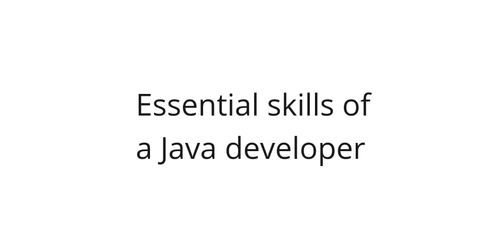What are the essential, technical and non-technical, skills of a Java developer?

Jenn К
author of all this stuff
Java developer is one of the most popular specializations in the IT field, the scale is that there are currently about 12 million developers who are familiar with Java. Impressive, right? So what do you need to know in order to be qualitatively different from the crowd and find your place in the field of Java development?
I would answer this question in one word: practice. A lot of practice and effort will definitely bring you the desired result, “but what to practice and what skills will definitely make me a great Java developer?” you may ask, the answer to this question is presented below:
- You should be certainly experienced at least at one MVC Framework (Playframework, Spring, JSF or Struts framework);
- SOAP based Web Services (Eclipse, JAX-WS or JAX-RS);
- Version Control mostly Mercurial (Hg), Git and Subversion (SVN) for concreteness;
- Some build tool (Ant, Maven, Shell Scripts, Make, Rake, Grunt, Gulp, SBT, etc.);
- Unit Testing framework (TestNG, JUnit, HtmlUnit (JS));
- Hibernate or JPA for databases (better both);
- JavaServer Pages Standard Tag Library (JSTL);
- Asynchronous JavaScript And XML (AJAX);
- Latest packages/API changes (for those who’s already good at Java);
- While developing you need to know where your app runs and how to improve its execution. For this purpose use JBoss, WebSphere, Tomcat or other app server/container configuration management and application deployment.
If you want to be a website developer, you should know:
- Java Server Pages (JSP) technology that allows web developers to dynamically generate HTML, XML and other web pages;
- Markup Languages like BBC, HTML, XML, SGML and JSON;
- Java Servlet API – standardized API for creating dynamic content to a web server (similar to PHP, CGI and Open-source web framework for .NET technologies);
- Java Naming and Directory Interface (JNDI);
- Model-view-controller (MVC) – an architectural template used in the design and development of software;
- MVC frameworks like Struts / Spring;
- Web Technologies like Javascript, JQuery and CSS.
Now let’s find out what non-technical skills you should know to become a Java developer:
- Curiosity –
You know it’s like when you have a problem or just an interesting case and you ask yourself “How?”, “Why?”, “What can I do with it?”, “What I need to solve this problem?”. Intellectual curiosity allows you find solutions and not just moving along with the daily grind;
- It’s an exciting time! –
In order to stay on the wave with new technologies and not to remain in the past, relying only on previously acquired skills, the developer should always be ready to say “yes” to everything new that he can use for high-quality execution of work. Technologies like Java 8, Java 9, Java 10, Big Data, Artificial Intelligence, Machine Learning are definitely worth your attention, because the technology industry is moving fast and needs to be kept up to be the most successful;
- Disciplined habit-building –
A highly qualified developer knows the value of his time and reputation and therefore strives to create a high-quality product on time and at minimal cost. To do this, even at the initial stage of coding, when you are just “stuffing your hand” you need to regularly devote time to practice. So, for starters, 30 minutes a day with a gradual increase in this time will be enough to train muscle memory. Ultimately, this will affect the speed and ease of performing certain tasks, which by then will be carried out almost automatically.
- Prioritization –
Sometimes working in the SDLC will feel like things are coming at you 100 miles a minute. This means that time management and focus can make all the difference between being productive and falling behind. When you're working as part of a fast-paced team, slacking isn't tolerated, so being able to prioritize tasks and projects is the only way to keep up with your co-workers;
- Communication –
The ability to establish communications is often underestimated when it comes to people of technical professions, because it is considered that they basically communicate with a computer. But it is not so. The ability to find a common language with the customer, as well as the ability to prove their professional point of view, is very important, given that most often the developer knows how best.
Good luck!

Jenn К
Author bio: author of all this stuff
